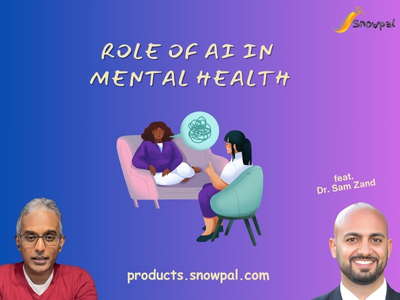Role of AI in Mental Health (feat. Dr. Sam Zand)
Psychedelic therapy, particularly with ketamine, is gaining traction in psychiatry. AI can augment mental health care by providing support between therapy sessions.
In this conversation, Dr. Sam Zand, a holistic psychiatrist and founder of Anywhere Clinic, discusses the integration of AI in mental health care, the benefits of psychedelic therapy, and the evolving role of technology in enhancing patient care. He emphasizes the importance of emotional regulation, the potential of AI to augment therapeutic practices, and the need for adaptability in the medical field. The discussion also touches on biases in human and AI interactions, the ROI of AI in healthcare, and the future of medicine as it embraces technological advancements.
They explore the intersection of technology, mental health, and human connection. They discuss the paradox of happiness in technologically advanced societies, the role of AI in early mental health support, and the necessity for emotional intelligence in the age of AI. Dr. Zand emphasizes the importance of viewing AI as a companion rather than just a tool, advocating for a symbiotic relationship that enhances human understanding and connection. The conversation also touches on the evolving landscape of education and the need for AI literacy across various disciplines.
Takeaways
Dr. Zand is a holistic psychiatrist focused on mental and emotional well-being.
Psychedelic therapy, particularly with ketamine, is gaining traction in psychiatry.
AI can augment mental health care by providing support between therapy sessions.
Emotional regulation is a key benefit of using AI in therapy.
AI can serve as an educator for new mental health practitioners.
Doctors should embrace AI to improve patient care and efficiency.
AI can help patients take charge of their own mental health journey.
The ROI of AI in healthcare is significant, especially in customer service.
Neuroplasticity allows the brain to adapt and regenerate, enhancing therapy outcomes.
Adaptability is crucial for both patients and healthcare providers in the evolving landscape of medicine. We often create problems and then seek solutions.
Mental wellness should be prioritized over mental illness.
AI can play a significant role in emotional regulation.
Loneliness is a major issue that AI can help address.
AI should be seen as an extension of human communication.
The younger generation uses AI as a life partner.
Emotional intelligence is crucial in the age of AI.
AI can help us evolve our consciousness and understanding.
Teaching AI about humanity can lead to better interactions.
The future of work will require AI literacy across all fields.
Podcast
Transcript
Snowpal Products
Backends as Services on AWS Marketplace
Mobile Apps on App Store and Play Store
Web App
Education Platform for Learners and Course Creators



